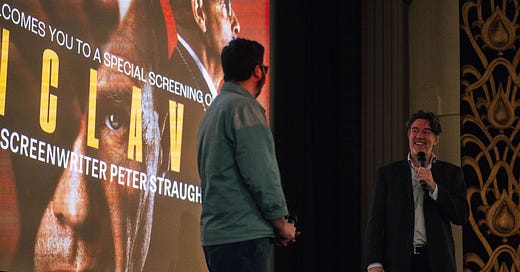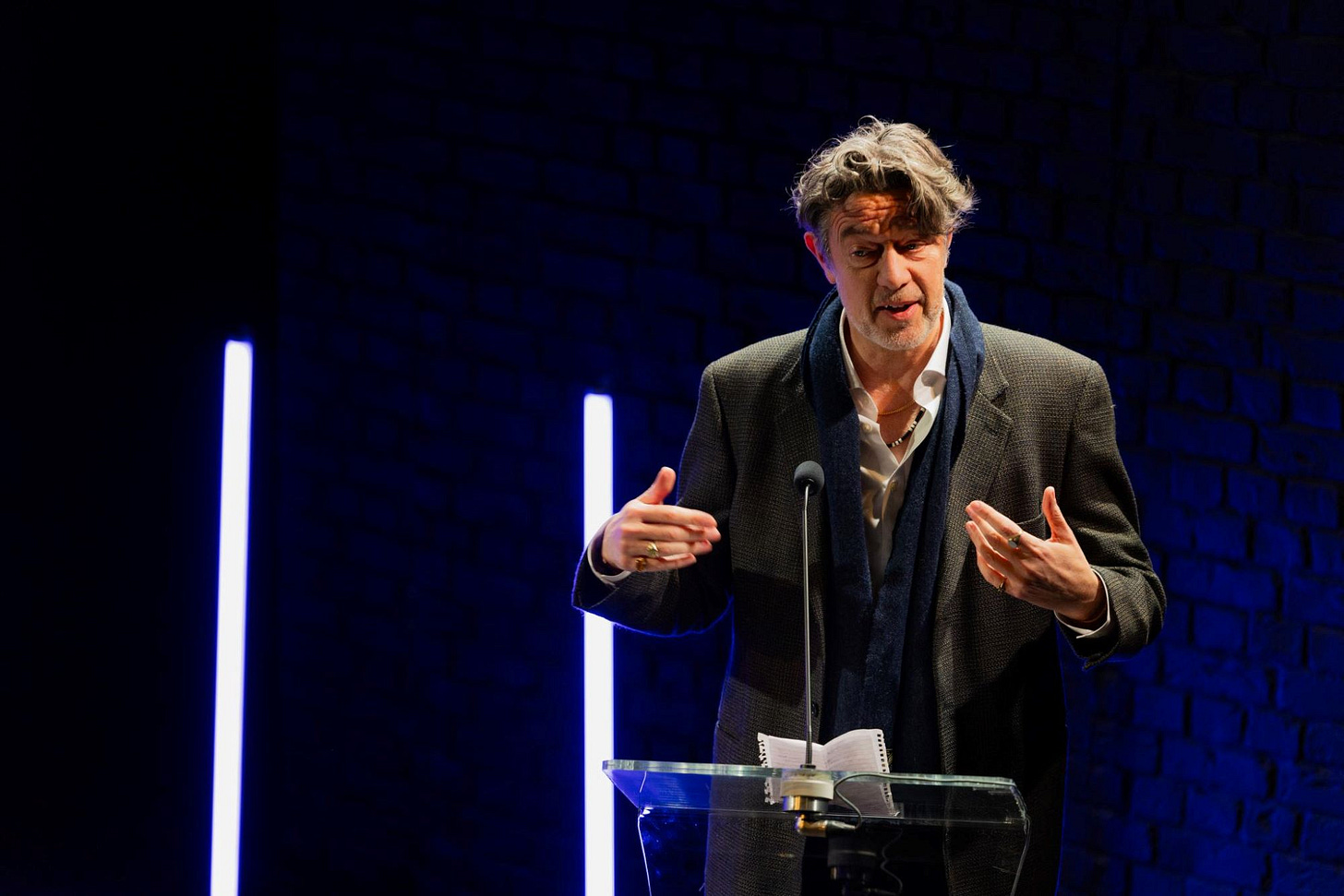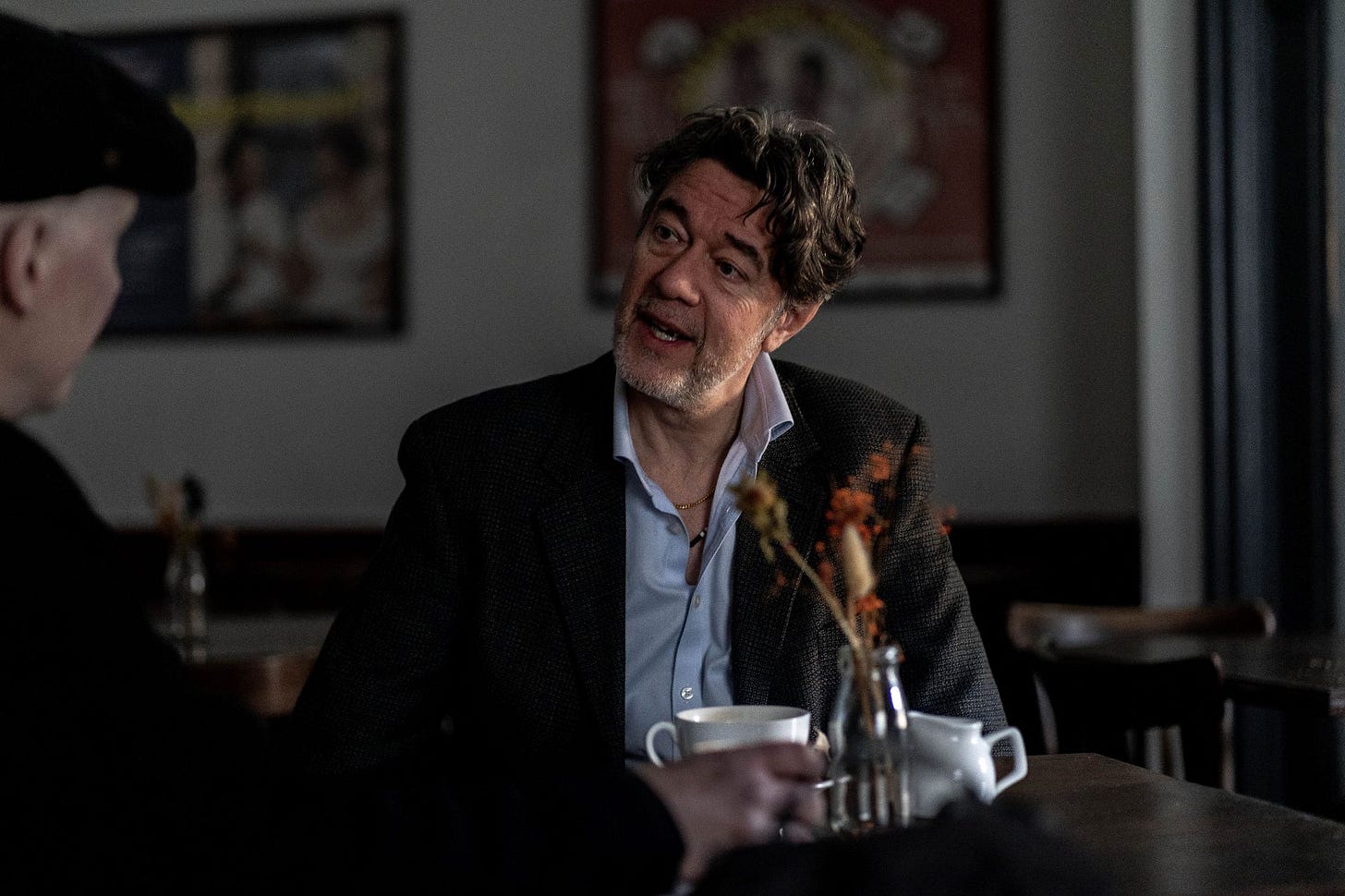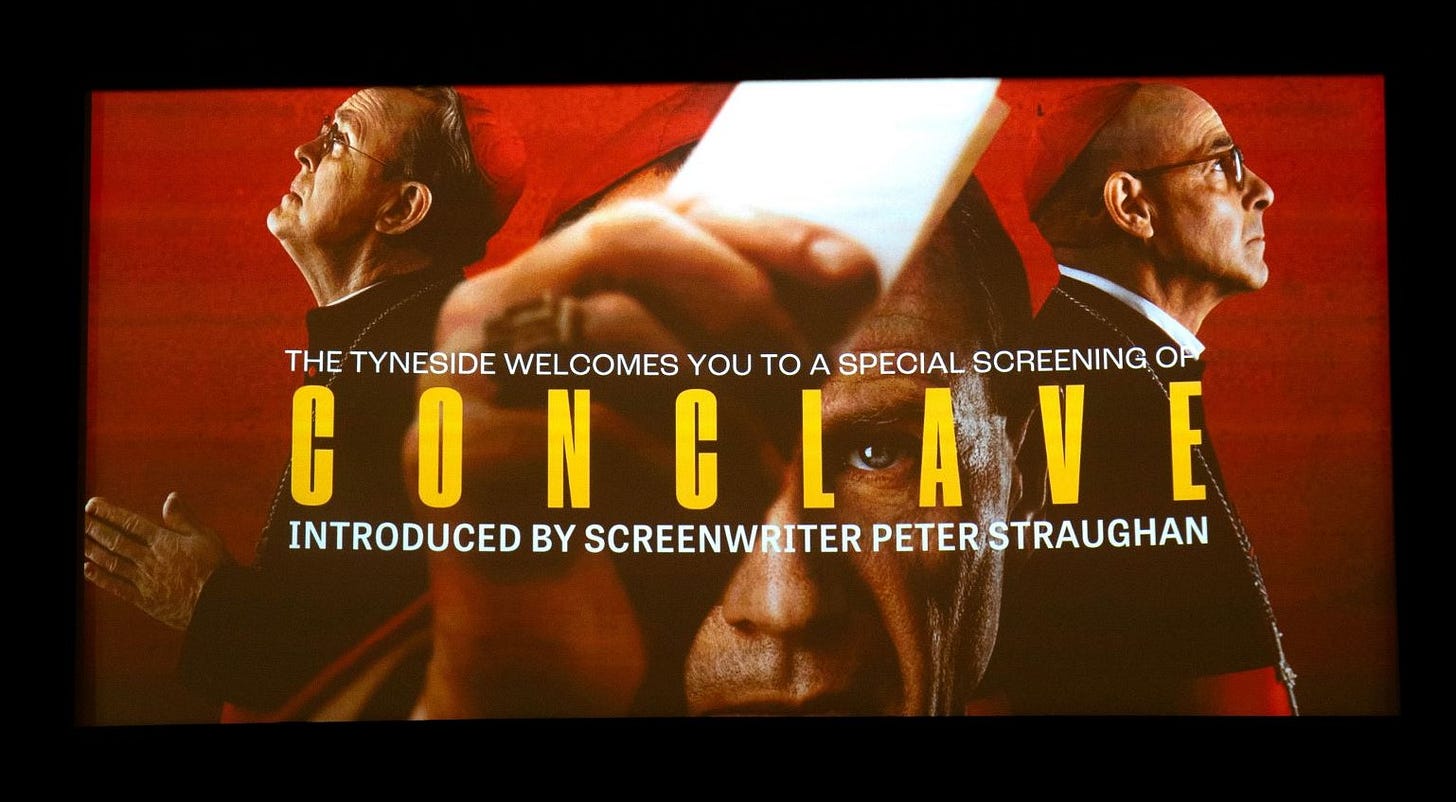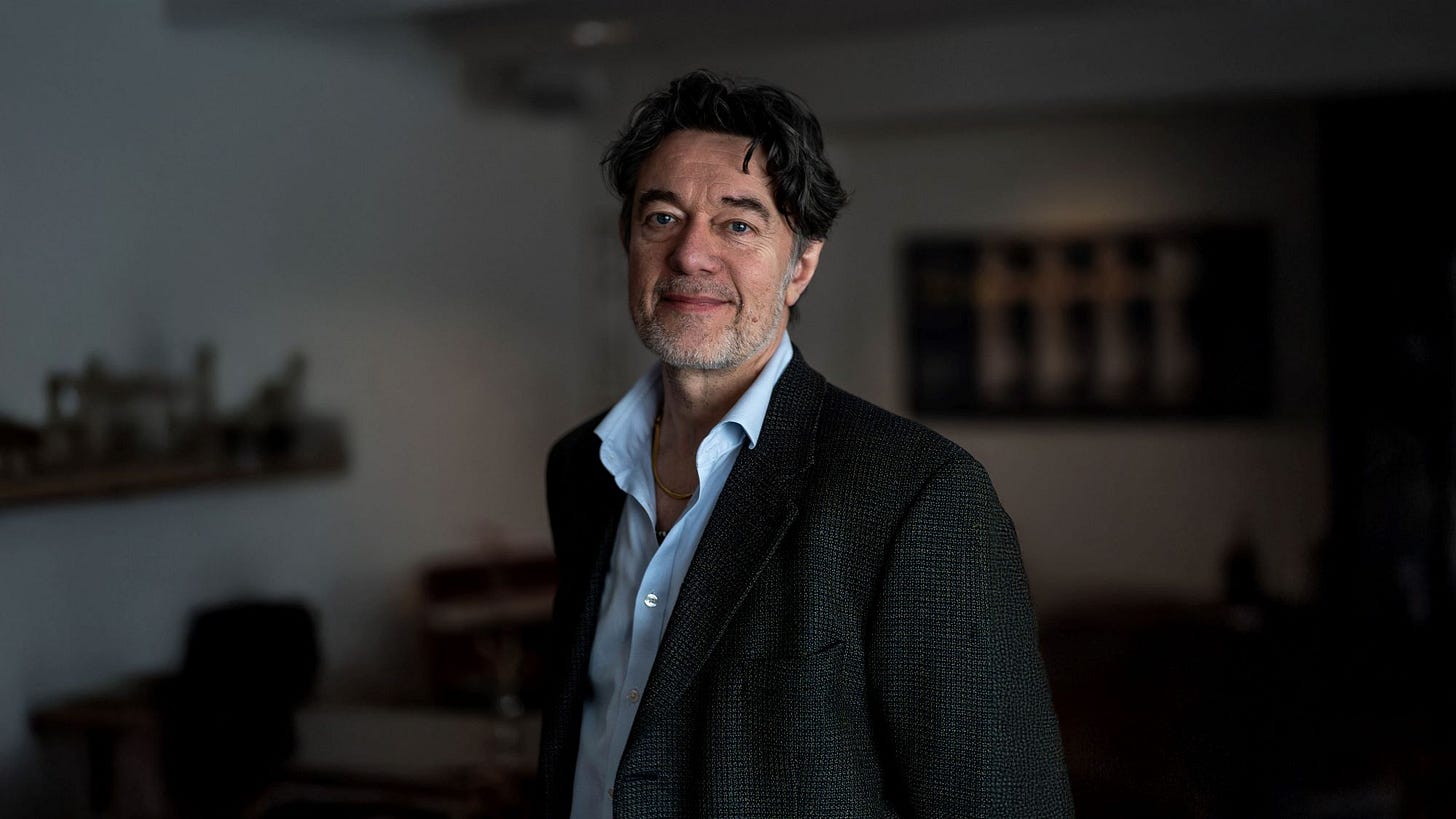Peter Straughan (Oscar nominated again) discusses Conclave
The screenwriter returned to the North East to talk about his craft and new hit film
Gateshead’s golden boy was back on Tyneside at the weekend, a chance for gifted screenwriter Peter Straughan to revisit old haunts before the climax of the red carpet season.
Will he get an Oscar figurine and a BAFTA mask, the British equivalent, to go with the Golden Globe he has already won (along with other prizes) as writer of hit film Conclave?
He’s nominated for both and the adaptation of Robert Harris’s novel exposing the intrigue behind electing a Pope has impressed audiences and critics.
“The lovely thing about Conclave is it’s the kind of film you’re not supposed to be able to do any more,” he said. “Mid-budget and for grown-ups.
“The idea that it could break out and reach a bigger audience… well, it doesn’t happen very often. So that’s been a delight and it makes you think it can be done.
“A friend sent a text that her 18-year-old daughter had sent to her, saying Conclave was fantastic. I wouldn’t have expected that but it’s lovely that it’s reaching younger audiences as well.”
Peter travelled from his home in Brighton to talk at a screenwriting conference (organised by New Writing North, sponsored by North East Screen) before introducing the film at the Tyneside Cinema.
“Coming over the bridge in the train I almost had a tear in my eye,” he confessed ahead of his Tyneside appearances.
This was a rare return. He explained that while he has two sisters in the North East, a third is in Yorkshire and it’s there they tend to gather since it’s nearer the midway point.
Aspiring screenwriters must have hung on every word of that conference speech, the name Peter Straughan having gone from the roll of a Gateshead comprehensive (St John Fisher, long since demolished) to major screen credits.
Film accolades aside, he also adapted Hilary Mantel’s acclaimed Wolf Hall trilogy about Thomas Cromwell for two hit BBC TV series.
The first won the BAFTA for best drama series and the second, Wolf Hall: The Mirror and the Light, might emulate it. The fact that a decade separates them shows screenwriting can be a long game.
Peter said his involvement with Conclave went back eight years to not long after the novel was published in 2016. Producers he’d enjoyed working with before sent him a copy.
“Then Edward Berger came on as the director and I’d been wanting to work with him for a long time so that was fantastic.”
The German’s epic version of All Quiet on the Western Front won multiple Oscars and BAFTAs in 2023 but Peter said he’d admired his TV work for years and his admiration only grew during their collaboration.
He recalled Berger saying he had “a sort of war film” on the go when they first met, and later realising their prolonged evening Zoom calls must have followed arduous days filming in the mud.
“That shows incredible stamina.”
Peter played down his considerable role in Conclave, saying Robert Harris’s novel had been “a joy” to adapt.
“It just fell naturally into a film shape. Robert’s a great writer so there’s fantastic dialogue and characters given to you.
“The first draft probably took me eight to 10 weeks. It wasn’t difficult. But then we started to experiment. Edward had ideas and we’d try things out.
“Then there was this long process of waiting for the stars to align with casting and people’s schedules and stuff, so that took a long time.”
Credited as executive producer as well as screenwriter, Peter was present when filming took place and enjoyed the process.
“Normally the writer’s not particularly welcome because you’re in the way, but I was there for most of the shoot, working a bit with the actors (including Oscar-nominated Ralph Fiennes and Isabella Rossellini) which is very rare.
“Having a director confident and relaxed enough to allow the writer to enter that conversation was a real pleasure.”
Peter’s route to screenwriting came via music, playing bass guitar with North East band The Honest Johns, and then through writing for the theatre which he got into when studying at Newcastle University.
He remembered fondly his time at Live Theatre, where he was artist-in-residence from 1999 to 2000, saying: “It felt like a family home, a safe and comfortable place to be.”
He wrote some plays for Live and also won the playwriting prize at the People’s Theatre.
Film, though, was a different and unfamiliar world. “Had North East Screen been around, I might have got there a bit earlier.”
He got there eventually and mastered the medium, notably with Tinker Tailor Soldier Spy which he worked on with his late wife, Bridget O’Connor, who, tragically, died of breast cancer months before it was released.
Their adaptation of the John le Carré novel won a BAFTA and was nominated for an Oscar but Peter travelled to the Los Angeles ceremony with their daughter, Connie.
Reflecting on that experience, he said: “It was sort of lovely because the film was being celebrated but so close to Bridget’s death that it was bitter-sweet. Strange, really. This time will feel more normal, I think.”
Peter said he still feels her influence when writing.
“Even when I was nominally writing on my own I was always talking about it with Bridget, getting her advice, and still, to be honest, I have that mental dialogue going on in my head.”
Another person he has been thinking of is his late mother who was a devout Catholic.
“One reason Conclave felt like something I wanted to do was that the Catholic world was familiar to me. I was brought up Catholic. I was an altar boy.
“When I think of Catholicism I think of my mother. There’s a nostalgia and warmth I have for the Catholic Church and I think that was good for the project. I wasn’t just a critical outsider although, God knows, there are reasons enough for a critique of the Catholic Church.”
Though no longer a believer, he thought it helped with Conclave that he’d “had one foot in the camp and one out”. He wished his mother could have seen the film. “She would have liked it.”
While stories land fully fledged on our screens, the film industry’s fraught with complications and delays. For a screenwriter like Peter, various plates have to be kept spinning simultaneously.
Conclave and Wolf Hall were projects running side by side and the plates are still spinning.
For TV, Peter has been adapting the work of two authors he admires. There’s Berlin Noir, the sequence of crime thrillers featuring German detective Bernhard Gunther, by the late Philip Kerr; and then there’s the Fractured Europe series by Dave Hutchinson, “nominally science fiction”.
And for the big screen there’s Folio, the story of the two actors who after Shakespeare’s death went to great lengths to gather and reassemble his play scripts, preserving them for posterity by publishing them in the famous First Folio.
The idea came from John Lightbody, an actor friend of Peter’s from university who inherited his late father’s love of Shakespeare.
It’s a collaborative work, a homage to the genius of the Bard and to John’s father, and it clearly fired Peter’s imagination.
“Scripts weren’t valued back then. Everything kept catching fire and everyone overwrote on paper because it was expensive, so about half the plays were printed and the rest, including some of the most famous ones, would have been lost.
“Books on the subject tend to be quite dry but I’m thinking this will be a comic drama.
“The idea that John and his father had, and it’s a lovely idea, is that the pair have to find the people who used to be the actors and ask them if they can remember their speeches.
“It’ll be a kind of road movie of them going round England to find these people who are now scattered and doing other jobs.”
When might we see that? From Peter, a smile and a shrug. In the world of film, who knows?
Conclave, though, is in the can and deserving of every accolade. The BAFTAs (it’s nominated in 12 categories) are to be presented on February 16; the Oscars or Academy Awards (eight nominations) in the early hours of March 3.


